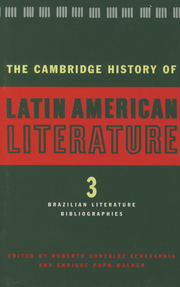Book contents
- Frontmatter
- Introduction to Volume 3
- 1 The literary historiography of Brazil
- 2 Colonial Brazilian literature
- 3 Brazilian poetry from the 1830s to the 1880s
- 4 Brazilian poetry from 1878 to 1902
- 5 The Brazilian theatre up to 1900
- 6 Brazilian fiction from 1800 to 1855
- 7 The Brazilian novel from 1850 to 1900
- 8 Brazilian fiction from 1900 to 1945
- 9 Brazilian prose from 1940 to 1980
- 10 The Brazilian short story
- 11 Brazilian poetry from 1900 to 1922
- 12 Brazilian poetry from Modernism to the 1990s
- 13 The Brazilian theatre in the twentieth century
- 14 Brazilian popular literature (the literatura de cordel)
- 15 Literary criticism in Brazil
- 16 The essay: architects of Brazilian national identity
- 17 The Brazilian and the Spanish American literary traditions: a contrastive view
- Bibliography
- Index
- References
5 - The Brazilian theatre up to 1900
Published online by Cambridge University Press: 28 March 2008
- Frontmatter
- Introduction to Volume 3
- 1 The literary historiography of Brazil
- 2 Colonial Brazilian literature
- 3 Brazilian poetry from the 1830s to the 1880s
- 4 Brazilian poetry from 1878 to 1902
- 5 The Brazilian theatre up to 1900
- 6 Brazilian fiction from 1800 to 1855
- 7 The Brazilian novel from 1850 to 1900
- 8 Brazilian fiction from 1900 to 1945
- 9 Brazilian prose from 1940 to 1980
- 10 The Brazilian short story
- 11 Brazilian poetry from 1900 to 1922
- 12 Brazilian poetry from Modernism to the 1990s
- 13 The Brazilian theatre in the twentieth century
- 14 Brazilian popular literature (the literatura de cordel)
- 15 Literary criticism in Brazil
- 16 The essay: architects of Brazilian national identity
- 17 The Brazilian and the Spanish American literary traditions: a contrastive view
- Bibliography
- Index
- References
Summary
The colonial period
Although there may have been occasional representations for the entertainment of the colonists in the half-century that followed the Portuguese conquest of Brazil in 1500, no record of theatrical activity exists until the Jesuits, who came to the colony in 1549, resorted to the theatre as a tool in their effort to educate the settlers and convert the Indians to the Catholic faith. The kind of theatre the Jesuits practiced in Brazil profited from their previous experience with the art form in Portugal. The new environment, however, required an overall simplification of their performances. As a result, the colonial Jesuit theatre marked a departure from the scholarly texts and ponderous productions they were known to stage in Portugal.
The major figure of the Jesuit theatre in Brazil is José de Anchieta (1534–1597). Born in the Spanish Canary Islands but educated in Portugal, at the age of sixteen Anchieta joined the Society of Jesus, which in 1553 sent him to Brazil, where he was to stay for the rest of his life. In the forty-four years he spent in Brazil as a teacher, missionary, and advocate of Indian rights, Anchieta proved to be a prolific writer of chronicles, letters, sermons, poems, and plays; he is also the author of a Tupi grammar and dictionary. Whereas Anchieta wrote tragedies in Latin for the benefit of his fellow Jesuits, his more important legacy, the autos, are in Portuguese, Spanish, and Tupi, and sometimes a combination of two or three of those languages. From the beginning, Anchieta understood that if he was to succeed in his didactic effort to convert the Indians and propagate the faith, the natives’ language had to be used.
- Type
- Chapter
- Information
- The Cambridge History of Latin American Literature , pp. 105 - 126Publisher: Cambridge University PressPrint publication year: 1996
References
- 3
- Cited by

